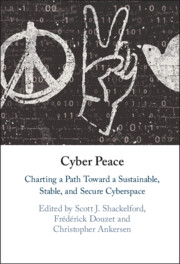Cyber Peace
The international community is too often focused on responding to the latest cyber attack instead of addressing the reality of pervasive and persistent cyber conflict. From ransomware against the city government of Baltimore to state-sponsored campaigns targeting electrical grids in Ukraine and the United States, we seem to have relatively little bandwidth left over to ask what we can hope for in terms of “peace” on the Internet, and how to get there. It’s also important to identify the long-term implications for such pervasive cyber insecurity across the public and private sectors, and how they can be curtailed. This edited volume analyzes the history and evolution of cyber peace and reviews recent international efforts aimed at promoting it, providing recommendations for students, practitioners, and policymakers seeking an understanding of the complexity of international law and international relations involved in cyber peace. This title is also available as Open Access on Cambridge Core.
Scott J. Shackelford is Cybersecurity Risk Management Program Chair and Executive Director of the Ostrom Workshop at Indiana University. He is also an affiliated scholar at both the Harvard Kennedy School’s Belfer Center for Science and International Affairs and Stanford’s Center for Internet and Society, as well as a senior fellow at the Center for Applied Cybersecurity Research.
Frédérick Douzet is Professor of Geopolitics at the University of Paris 8, Director of the French Institute of Geopolitics research team (IFG Lab), and Director of the Center for Geopolitics of the Datasphere (GEODE). She was appointed a member of the French Defense Ethics Committee in January 2020.
Christopher Ankersen is Clinical Professor of Global Affairs and Faculty Lead, Global Risk Specialization at New York University’s Center for Global Affairs. He has previously worked for the United Nations and the Canadian Armed Forces.



